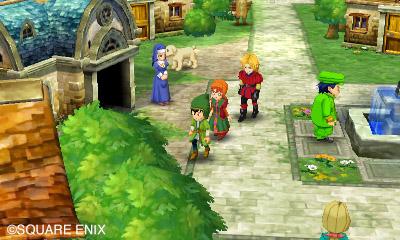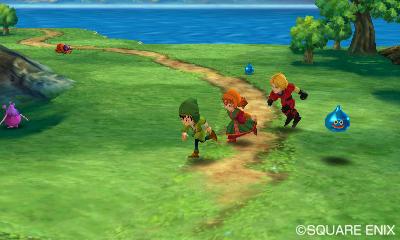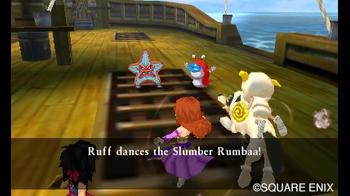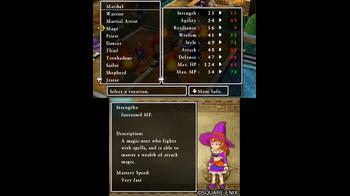
Dragon Quest VII: Fragments of the Forgotton Past - Review
When the 3DS remake of Dragon Quest VII originally released in Japan in 2013, western Dragon Quest fans waited month after month for news of a localization. Soon those months of waiting turned into years of silence, and Dragon Quest's English future seemed more and more uncertain. Thankfully, that uncertainty didn't last.
With Nintendo finally announcing western releases for Dragon Quest VII and VIII on 3DS, in addition to Square Enix's localizations for Dragon Quest Heroes and the soon-to-be-released Dragon Quest Builders, the long-lived RPG series seems to once again have a footing in North America and Europe.
Dragon Quest VII: Fragments of the Forgotten Past - a remake of the 2000 PSX release - is mechanically a classic turn-based JRPG through and through. Even if you don't know much about the game itself, you may of heard of its infamous daunting length - with some claims even listing playtimes greater than 100 hours. While those numbers are perhaps slightly exaggerated, a playthrough is indeed a bit of a time commitment. However, Dragon Quest VII is built in such a way that quite works well with its aggregate length.
Instead of focusing on a singular overarching central narrative, DQ7 instead features a vignette-style approach to its story elements.
At the game's onset, our hero gains the ability to travel into the past. He is soon tasked to visit individual islands to save them from their respective fates. For the most part, the narratives surrounding each of these islands are isolated from one-another and each hold its own short-story to tell.
By collecting 'Fragments' from all over the world, the party can visit more and more of these islands as the player progresses through the game.
DQ7 takes a different approach than most RPGs when it comes to its storytelling. Rather than intimate character focus being given to the playable party, the game instead places more emphasis on the game's many NPCs. That's not to say the playable characters don't have their own sympathies and personalities, more that DQ7's story isn't really about them. It's about the normal, everyday people met along the way.
This vignette style gives DQ7 an especially adventurous feel. These many short stories are well-crafted, well-executed, and often emotionally touching. Just as importantly, they rarely overstay their welcome. As a matter of fact, these facets are truly Dragon Quest VII's largest strength. These conflicts are introduced through interaction with NPCs, and these interactions are believable and varied, yet succinct.

The amount of drama entwined into these conflicts feels especially appropriate. There's enough present to create sympathy for these characters, but not too much to overdo it.
One example features a love-triangle type episode between a handful of NPCs. Rather than dumping excessive dialogue and exposition, the story of these characters is more naturally uncovered piece by piece through short scenes and by chatting with other NPCs of the island. Once the player starts to piece together this particular sub-story, it culminates in a moving realization on what exactly unfolded without showing the player directly.
It's a great contrast to more typical video game storytelling which occasionally rely on melodramatic cutscenes overstuffed with dialogue. DQ7 keeps things short and sweet without hammering a forced feeling of emotion over the player's head. It's a great example of how sometimes 'less is more'. There are several similarly memorable vignettes throughout the game.
The general gameplay loop involves speaking with the island population, learning about their plight, and then ultimately traversing a dungeon and taking on some villain or creature as you work to resolve the island's conflict.
This segmented story structure allows DQ7 to be very playable in parts, and the 3DS remake adds more conveniences for the player in this regard. A new menu options recap 'the story so far' and provide hints as to where to go next or where to find more fragments. Additionally, as you progress through a dungeon area, Fragments will appear on the minimap - making collection of these key pieces much simpler to do.
The central component to Dragon Quest VII's combat lies in its job system. Similar to the class system in other Dragon Quest games, any character can be outfitted to any profession such as Warrior, Martial Artist, or Priest.
By leveling up in these various classes, the characters can learn a multitude of abilities and access more advanced classes. Unfortunately, getting access to the job system in the first place takes about 15-20 hours of playtime, which isn't ideal considering it's one of the core gameplay components.
Not every ability can be used by every class, but there is still some flexibility in how the player can construct characters with a desired moveset.
DQ7's battle gameplay doesn't need much elaboration. It is very much a classic turn-based RPG where monsters are fought through skill selection via a menu. Generally speaking, while some of the later-game bosses aren't exactly pushovers, DQ7 is not difficult enough to require intricate party set-ups. As long as you have characters capable of dealing damage, healing, with some stat-buff abilities mixed in, you should be able to overcome anything the game throws at you.
While the 3DS remake brings a lot of enhancements to Dragon Quest VII, there a few trifling issues that appear. Instead of using more classic random encounters, the 3DS version initiates combat by encountering enemy icons on the field.

This works well on the world map, but can actually be quite a nuisance in many of the dungeons which feature narrow passageways. These enemy icons are especially difficult to avoid within these small corridors, and often clearing a battle will spawn another enemy in front of you which can also be tricky to avoid. This can lead to some areas exhibiting an irritatingly high "effective encounter rate" because the player has little choice but to keep running into these field monsters.
Furthermore, the game can tend to be repetitive in places. At many times throughout the 70-80 hour journey, you are asked to backtrack through dungeons and locations in order to progress - sometimes more than twice. Combined with each location having a 'past' and 'present' version to explore, this sort of padding is a significant blemish on what is otherwise a well-designed game.
Dragon Quest VII is a leisurely adventure full of memorable vignettes and and locations. While it is very much a classic turn-based RPG, the style and tone of the game's narrative is something not often seen within the genre, even 16 years after its original release. Despite a handful of problems, DQ7 is well worth a playthrough if you can set aside the time for it.

